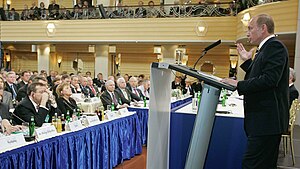2007 Munich speech of Vladimir Putin
| ||
|---|---|---|
Media gallery |
||
The 2007 Munich speech was given by Russian president Vladimir Putin in Germany on 10 February 2007 at the Munich Security Conference. The speech expressed significant points of future politics of Russia driven by Putin.[1][2][3][4]
Synopsis
Putin criticized what he called the United States' monopolistic dominance in global relations, and its "almost uncontained hyper use of force in international relations". The speech came to be known, especially in Russia,[citation needed] as the Munich speech. He said the result of such dominance was that,[5]
[…] no one feels safe! Because no one can feel that international law is like a stone wall that will protect them. Of course such a policy stimulates an arms race.
Putin quoted a 1990 speech by Manfred Wörner to support his position that NATO promised not to expand into new countries in Eastern Europe:[5][6]
[Worner] said at the time that: "the fact that we are ready not to place a NATO army outside of German territory gives the Soviet Union a firm security guarantee." Where are these guarantees?
Although NATO was still a year away from inviting Ukraine and Georgia to become NATO member-states in 2008, Putin emphasized how Russia perceived eastward expansion as a threat:
I think it is obvious that NATO expansion does not have any relation with the modernisation of the Alliance itself or with ensuring security in Europe. On the contrary, it represents a serious provocation that reduces the level of mutual trust. And we have the right to ask: against whom is this expansion intended?
Putin also publicly opposed plans for the U.S. missile shield in Europe, and presented President George W. Bush with a counter proposal on 7 June 2007 which was declined.[7] Russia suspended its participation in the Treaty on Conventional Armed Forces in Europe on 11 December 2007 because:
Seven years have passed and only four states have ratified this document, including the Russian Federation.[5]
Response
In response, former NATO secretary Jaap de Hoop Scheffer called it, "disappointing and not helpful."[8] The months following the Munich speech[5] were marked by tension and a surge in rhetoric on both sides of the Atlantic, though both Russian and American officials, however, denied the idea of a new Cold War.[9]
The Polish Institute of International Affairs has described Putin's quotation from Manfred Wörner's speech as lacking appropriate context, stating that Wörner's speech "in fact, only concerned non-deployment of NATO forces on East German territory after reunification."[6]
Legacy
In the run-up to and following the launch of the 2022 Russian invasion of Ukraine, the speech was revisited, with some commentators arguing it to be a revealing moment of Putin's later intentions.[10][11][12][13] According to Andrew A. Michta, Western leaders failed in 2007 to recognize the speech "amounted to a declaration of war on the West."[14] Other commentators, like John Mearsheimer and Stephen F. Cohen, would cite it as Putin's most explicit warning that Russia perceived NATO's eastward expansion as a threat to its national security.
Follow-ups
Putin later made other speeches that were called[15] follow-ups to the Munich speech. These include:
- The 2013 Valdai speech of Vladimir Putin in Sochi on 19 September 2013
- The Crimean speech of Vladimir Putin to the Federal Assembly of Russia on 18 March 2014
- The 2014 Valdai speech of Vladimir Putin in Sochi on 24 October 2014
- The 2015 U. N. General Assembly speech of Vladimir Putin in New York on 28 September 2015 ("I'm urged to ask those who created this situation: do you at least realize now what you’ve done?")[16]
See also
References
- ^ "Putin says U.S. Wants to dominate world". Reuters. 10 February 2007.
- ^ Shanker, Thom; Landler, Mark (11 February 2007). "Putin Says U.S. Is Undermining Global Stability". The New York Times.
- ^ "Putin rails against US foreign policy". Financial Times. 10 February 2007.
- ^ "Putin Slams US for Making World More Dangerous | DW | 10.02.2007".
- ^ a b c d "Speech and the Following Discussion at the Munich Conference on Security Policy". kremlin.ru. 10 February 2007.
- ^ a b Documents Talk: NATO-Russia Relations After the Cold War. pism.pl. 2020. p. 375. ISBN 978-83-66091-61-0.
- ^ "Press Conference following the end of the G8 Summit". kremlin.ru. 8 June 2007. Retrieved 2019-06-10.
- ^ Watson, Rob (10 February 2007). "Putin's speech: Back to cold war? Putin's speech: Back to cold war?". BBC News. Retrieved 2019-06-10.
- ^ "Munich Conference on Security Policy, As Delivered by Secretary of Defense Robert M. Gates, 11 February 2007". DefenseLink. United States Department of Defense. Archived from the original on 2007-02-14.
- ^ Fata, Daniel (7 February 2022). "Putin Announced His Manifesto Against the West Fifteen Years Ago. His Story Hasn't Changed". The Bulwark. Retrieved 16 August 2022.
- ^ Ignatius, David (20 February 2022). "Putin warned the West 15 years ago. Now, in Ukraine, he's poised to wage war". Washington Post. Retrieved 16 August 2022.
- ^ Fried, Daniel; Volker, Kurt (18 February 2022). "The Speech In Which Putin Told Us Who He Was". Politico. Retrieved 16 August 2022.
- ^ Rachman, Gideon (9 April 2022). "Understanding Vladimir Putin, the man who fooled the world". The Guardian. Retrieved 16 August 2022.
- ^ Michta, Andrew A. (7 August 2022). "China, Russia and the West's Crisis of Disbelief". Wall Street Journal. Retrieved 16 August 2022.
- ^ "Munich – Valdai – Crimea". ASEAN Centre in MGIMO. 1 July 2014.
- ^ "70th session of the UN General Assembly". kremlin.ru. 28 September 2015. Retrieved 2019-06-10.

